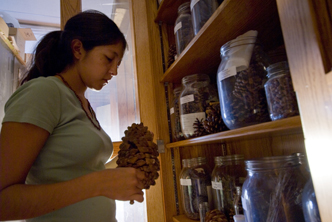Representatives from five universities will meet in Flagstaff on August 15-17 to discuss how to increase access to and use of natural history collections by Native American undergraduate students.
The meeting will be hosted by Merriam-Powell’s Colorado Plateau Biodiversity Center as part of AIM-UP!, an effort funded by the National Science Foundation to explore how life science collections can be used in undergraduate education.
Universities often maintain collections that contain specimens of plants, vertebrates, fossils, fungi and other life forms that have been gathered and cataloged by researchers. These collections are critical to understanding changes in biological diversity and evolutionary adaptation.
“NAU has a long-term commitment to increasing educational opportunities in the sciences for Native American students, and the Biodiversity Center wants to explore how its collections can be used to further that goal,” said Stefan Sommer, director of the Colorado Plateau Biodiversity Center. “NAU’s life sciences collections contain some 500,000 specimens that offer not only researchers but also students an incredible resource.”
The Colorado Plateau Biodiversity Center brings together the university’s various life sciences collections under one framework to improve communication and collaboration. Sixteen faculty curators oversee seven divisions, which include quaternary paleoecology, botany, marine invertebrates and mollusks, insects and arachnids, vertebrates, fungi, and environmental genomics and genetics.
In addition to NAU, meeting participants include representatives from Arizona State University; University of California, Berkeley; University of Idaho; and University of New Mexico. Participants will discuss how ongoing research projects and efforts to cataloge biodiversity can be incorporated into teaching modules that are both place based and culturally relevant to Native American students.



